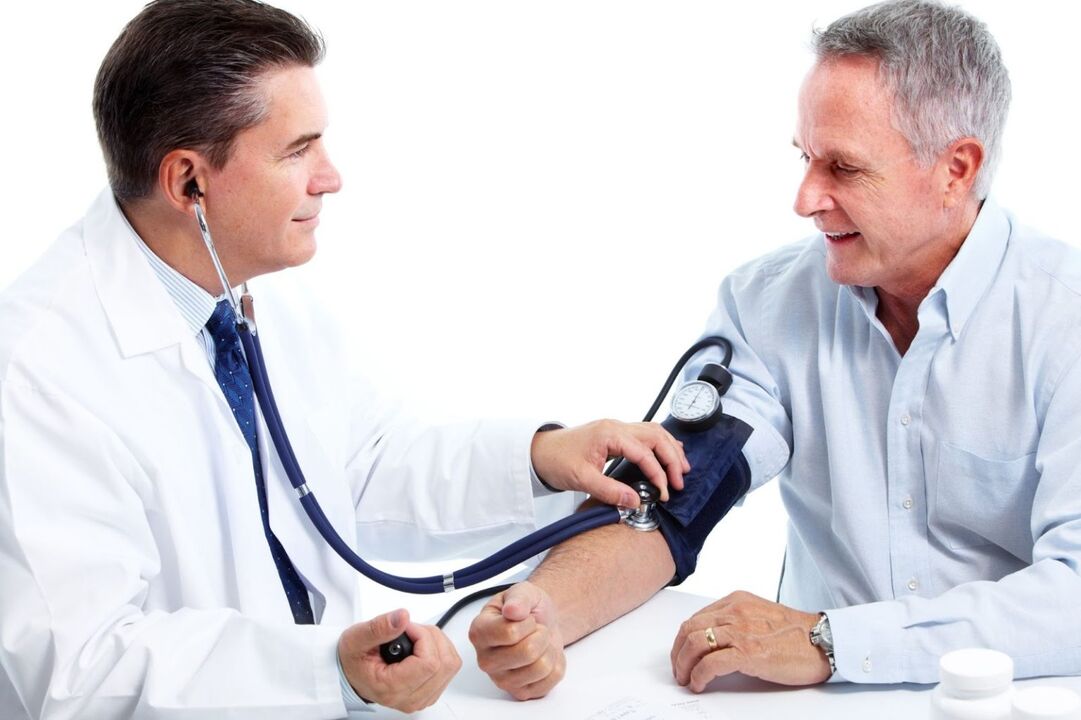Often, due to recent illnesses, it is increasingly common in young people, but due to increased blood pressure (blood pressure) or high blood pressure.At the same time, people often don’t doubt a serious problem, and many people have headaches with poor sleep or bad weather.Lack of high pressure treatment can lead to the development of stroke and heart attacks.Therefore, in order to detect the disease in a timely manner, it is necessary to study the main causes of hypertension in detail.
What is hypertension
Arterial hypertension (hypertension), hypertension or hypertension is a serious chronic disease characterized by a continuous increase in blood pressure (while the index of up-systolic pressure is above 140 mm Hg, while the down-diastolic pressure is above 90 mm Hg).Hypertension is the most common disease in the cardiovascular system.The increase in blood pressure in the blood vessels occurs due to stenosis of the arteries and their small branches-arteries.
The value of blood pressure depends on the peripheral resistance, i.e. the elasticity of the blood vessels.The stimulation of hypothalamic receptors is large, causing microphosphate and arterial spasm of the renin-angiotensin-aldosterone hormone, whose walls thicken, begin to produce an increase in blood viscosity.This leads to the emergence of arterial hypertension, which eventually becomes irreversible and stable.There are two forms of high pressure:
- Essential (main).This is 95% of cases of hypertension.The reason for this form is the overall total (genetic, poor ecology, excessive weight).
- secondary.5% of cases of hypertension.This form of hypertension is caused by internal diseases (kidney, liver, heart disease).
If you notice a person, you can doubt the initial stage of the disease or its hidden process:
- Memory deteriorates;
- Headache;
- An anxious feeling of non-motion;
- cold;
- Hyperhidrosis (increased sweating);
- The little dot in front of you;
- Numb fingers;
- Hyperemia (redness) of the skin in the anterior area;
- Heartbeat;
- irritability;
- Low performance;
- The face swelled in the morning.
Causes of hypertension
As the body functions normally, the heart drives blood through all blood vessels, transporting nutrients and oxygen to the cells.If the arteries lose elasticity or are blocked, the heart begins to become stronger, the tone of the blood vessels increases and the diameter becomes narrower, resulting in high pressure.The onset of hypertension is caused by diseases of the autonomic nerve and central nervous system, which is closely related to emotions.Therefore, when a person is nervous, he often starts to increase stress.
60 years later, when cholesterol plaques overlap normal blood, the development of arterial hypertension is associated with the emergence of atherosclerosis (chronic artery).In this case, the patient's up pressure can be increased to 170 mm Hg.Artistic, the bottom remains less than 90mm Hg.Art.In addition, many doctors have identified the general causes of arterial hypertension:
- Violating blood circulation in all vital organs;
- Psychological - Emotional overconstruction;
- muscle superposition across the cervical vertebra;
- Genetic pathology;
- Reduced elasticity and thickened blood vessels;
- downturn (sitting lifestyle);
- Hormonal changes;
- Diseases of the internal organs (liver, kidney).
- Overconsumption of salt;
- bad habits.

In a man
Usually, the appearance of hypertension is affected by men aged 35 to 50.Hypertension is diagnosed in patients who already have a stable form of the disease.This is because men ignore the first sign of illness.Their work usually causes high blood pressure.The disease affects those who have activities associated with severe physical and mental stress.Responsible workers suffer from this disease and any mistakes are always stressful.Other causes of hypertension in men:
- Smoking, drinking;
- A sedentary lifestyle;
- Not following nutritional rules (fast food, candy);
- Kidney disease (glomerular nephritis, pyelonephritis, urolithiasis);
- Take medications (medicines from colds, colds, sleeping pills or hormonal medications);
- Ignore physical exercise;
- Vascular problems (atherosclerosis);
- Trauma in the central nervous system (central nervous system).
Among women
The symptoms of arterial hypertension in men and women are not particularly different (shortness of breath, headache, ears, dizziness in the ears), but weaker sexual behaviors are more likely to encounter this disease.The causes of high blood pressure in women may be similar to those in men, which is due to hormones.Even having this condition in the form is not a strong sexual characteristic at all - it is high blood pressure during menopause and during pregnancy.
Typically, in women, hypertension is diagnosed during menopause (after 45 to 50 years).At present, the body has undergone a major change: the amount of estrogen produced begins to shrink.In addition, the causes of high blood pressure in women may be as follows:
- Receive birth control pills;
- pressure, overload;
- Insufficient potassium content in the body;
- hypoemia (sitting lifestyle);
- Too much weight;
- Malnutrition;
- childbirth;
- Bad habits (alcoholism, smoking);
- diabetes;
- Cholesterol metabolism;
- The pathology of the kidneys, adrenal glands;
- Vascular disease;
- Obstructive apnea syndrome (respiratory stagnation).
When young
Hypersonic disease is rarely observed in people under the age of 25.When only the upper pressure indicator changes, blood pressure at youth is often associated with neurocirculatory dystonia (a complex of cardiovascular system disease).During class, the reasons for children’s violations can be a huge burden.In almost all cases, hypertension in children is a result of endocrine system pathology, i.e. hypertension in children is usually secondary.There may be other reasons for developing arterial hypertension at a young age:
- genetic factors;
- Overeat and use a lot of salt;
- Weather conditions;
- Spine disorders.
- Electromagnetic, sound radiation;
- Excessive distortion of nerves;
- renal pathology;
- Intake of drugs that affect blood pressure;
- overweight;
- Deficiency of potassium in the body.
- Not compliant with sleep status.
Causes of hypertension development
The occurrence of hypertension in 90% of patients is related to cardiovascular disease (atherosclerosis, heart pain, etc.).The remaining 10% are associated with symptomatic hypertension, i.e. hypertension is a hallmark of another disease (renal inflammation, adrenal tumors, renal artery stenosis), hormone failure, diabetes, traumatic brain injury, and stress.Risk factors for the development of hypertension are classified according to two indicators:
- uninstall.The reason why a person cannot influence.This includes:
- Genetic.Arterial hypertension is considered a disease that is transmitted through genes.Therefore, if the family has hypertension, the disease may appear in the next generation.
- Physiological factors.Middle-aged men are more susceptible to disease than fairer genders.This is explained by the fact that during the ages of 20 to 50, women's bodies produce more sex hormones to perform protective functions.
- Changed.Factors that depend on a person, his lifestyle and decisions:
- A sedentary lifestyle;
- Too much weight;
- pressure;
- bad habits;
- Insomnia;
- Use a lot of caffeine, salt, and cholesterol;
- Take medicine;
- weightlifting;
- Weather fluctuations.

Genetics
One of the factors that susceptibility to arterial hypertension is heredity.These may be anatomical features transmitted by genes.They are expressed in difficulty in blood flow, which can affect the increase in blood pressure.Hypertension is present in relatives of the first contacted relative (mother, father, grandparent, local brother or sister), which means the possibility of developing the disease is high.If hypertension is immediately observed in several relatives, the risk of disease development is increased.
Usually, hypertension itself is genetically inherited, but is only susceptible to it, which is due to neuropsychological responses and metabolic characteristics (carbohydrates, fats).Generally, the implementation of genetic pathological trends is caused by external influences: nutrition, living conditions, adverse climatic factors.
disease
Cardiovascular disease (heart disease, ischemia) can cause hypertension.With these diseases, the gaps in the aorta are partially narrowed - meaning increased pressure.Vascular defects in polyarthritis nodular also help blood pressure growth.Diabetes is another cause of arterial hypertension.The presence of atherosclerotic plaques narrows the cavity of blood vessels, which is an obstacle to normal blood circulation.The heart begins to function in an enhanced pattern, thereby increasing stress.Diseases that can cause hypertension:
- Kidney inflammation;
- pathology of the lymphatic system and liver;
- Cervical osteochondrosis;
- invasion of the pancreas and thyroid;
- arteriosclerosis;
- Nutrition - vascular dystonia;
- Adrenal tumors;
- Brain injury;
- Narrowing of renal artery.
Hormone changes
Violations of endocrine organs (thyroid, hypothalamus, pancreas, adrenal glands) are the cause of high pressure.These pathological processes slow down the production of sex hormones and their effects on the brains of lower appendages, especially for women during menopause.Serious causes of elevated blood pressure, which lead to excessive hormone synthesis are the following diseases:
- Cushing syndrome;
- Thyroid toxicity (hyperthyroidism) - Increased thyroid function;
- Tumors on the adrenal glands;
- acromegaly (impaired function of the anterior pituitary gland);
- pheochromocytoma (hormone-active tumor);
- Kon syndrome.
age
Usually, hypertension is often observed in older people.This is because over time, the arteries lose elasticity, which has a big impact on stress.In addition, among people 40 years later, the metabolic process slowed down, and in the context of consuming large amounts of high-calorie foods, obesity develops, and then hypertension.
Today, the causes of this disease, such as age, have changed.The disease is significantly younger, with about 10% of teenagers suffering from pathology and the percentage only increases with age.40 years later, every three residents have high pressure.Indeed, in addition to the natural decline of physical resistance, the effects of inheritance also change with age.
Life
Another reason for arterial hypertension is the lack of physical activity.Exercise has a beneficial effect on blood circulation and the entire body, but not many people decide to start a positive lifestyle to protect themselves from the development of high blood pressure.Lack of physical exercise can lead to obesity and overweight, which can increase blood pressure.
Low input is a common disease in our time when a person moves very little, which leads to work that violates blood vessels.Unhealthy nutrition, bad habits, improper lifestyle can cause high blood pressure because of the weakening of muscle tissue and the spine that reduces the blood vessel tone required for good blood circulation.Working on a computer also increases the risk of disease.

Nutrition
The next factor that causes hypertension is malnutrition.Salt, sweet, fried, acute, smoked and fatty foods often cause unplanned stress increases.Indeed, it takes a certain amount of time for the kidneys to remove excess sodium from the body.The excessive amount of salt will hold water before it happens, which can stimulate swelling in people with high blood pressure.
A lack of potassium can increase blood pressure.This element helps relax blood vessels and the body contains no sodium.Tomatoes, dairy products, cocoa, potatoes, beans, parsley, plums, melons, bananas, green vegetables, sunflower seeds have a lot of potassium.These products should be included in your daily diet.It is necessary to reject fat, fatty meat and smoked meat as they can cause excessive weight and are often accompanied by high pressure.In addition, such foods are harmful to the body:
- butter;
- Canned food;
- heart;
- Fat cream, butter;
- Sharp seasoning;
- flour products;
- Use caffeine-based supplement drinks;
- Sweet soda.
bad habits
High doses of alcohol and the hangover caused by this hangover can negatively affect health.Regular and excessive drinking can increase heartbeat, increase blood pressure sharply, and lead to heart attacks.Smoking will not affect stress.Nicotine helps increase pulse and rapid wear of the heart, leading to the development of coronary artery disease and atherosclerosis.
Tobacco and alcohol have a negative impact on the entire organism.When smoking and drinking, swelling occurs first, and then blood vessels decrease drastically, resulting in spasms and blood worsens.Therefore, blood pressure increases.In addition, chemicals that are part of the cigarette can violate the elasticity of the blood vessel walls and form plaques that block the arteries.
Too much weight
Common causes of hypertension are obesity and overweight.Due to sedentary lifestyle, metabolic diseases, high fat content, rich carbohydrates, salt content, and excessive weight.People who are open are always at risk because their high blood pressure increases with the load on blood vessels and the heart.
In addition, obesity increases blood cholesterol, which can cause diabetes to occur.The weight of a patient who weighs more than 3 times higher than that of a patient with a normal weight is three times higher.Obese patients are more susceptible to atherosclerosis, another factor in the appearance of hypertension.Even if you lose 5 kg, weight loss can significantly lower blood pressure and improve blood sugar.
Ecology
Many people have a painful reaction to the weather, that is, weather dependence.Even a completely healthy person who is rarely in the fresh air and leads a sedentary lifestyle, may be sensitive to changing the weather.Usually, shocks in patients with hypertension occur in abnormal climate and landscape conditions, so prepare a road kit before traveling.
The poor urban ecology also severely increases blood pressure, damages the cardiovascular system and develops hypertension.Even the brief action of harmful substances that everyone inhales daily can cause the development of hypertension.Three common pollutants in all modern cities – nitrogen dioxide, ozone, sulfur dioxide – negatively affect blood pressure and vascular function.

pressure
Neuroemotional stress (stress, nerve collapse, excessive mood) is the most common cause of exacerbating hypertension.For human health, any unexpressed and frustrated emotions are dangerous.The long-term stress experience is a constant stress that wears out blood vessels and the heart faster than in a calm atmosphere.The consequence of nerve collapse is usually an increase in stress and hypertension crisis.The stress combined with alcohol and smoking is particularly harmful because this combination dramatically increases blood pressure.
Usually, for people with high blood pressure, the stress is elevated and lasts longer, even with mild emotional stress.Gradually, as the blood pressure rises repeats, it can last for several months, the device responsible for regulating blood pressure is used for loading, and the blood pressure is slowly fixed at a certain level.























